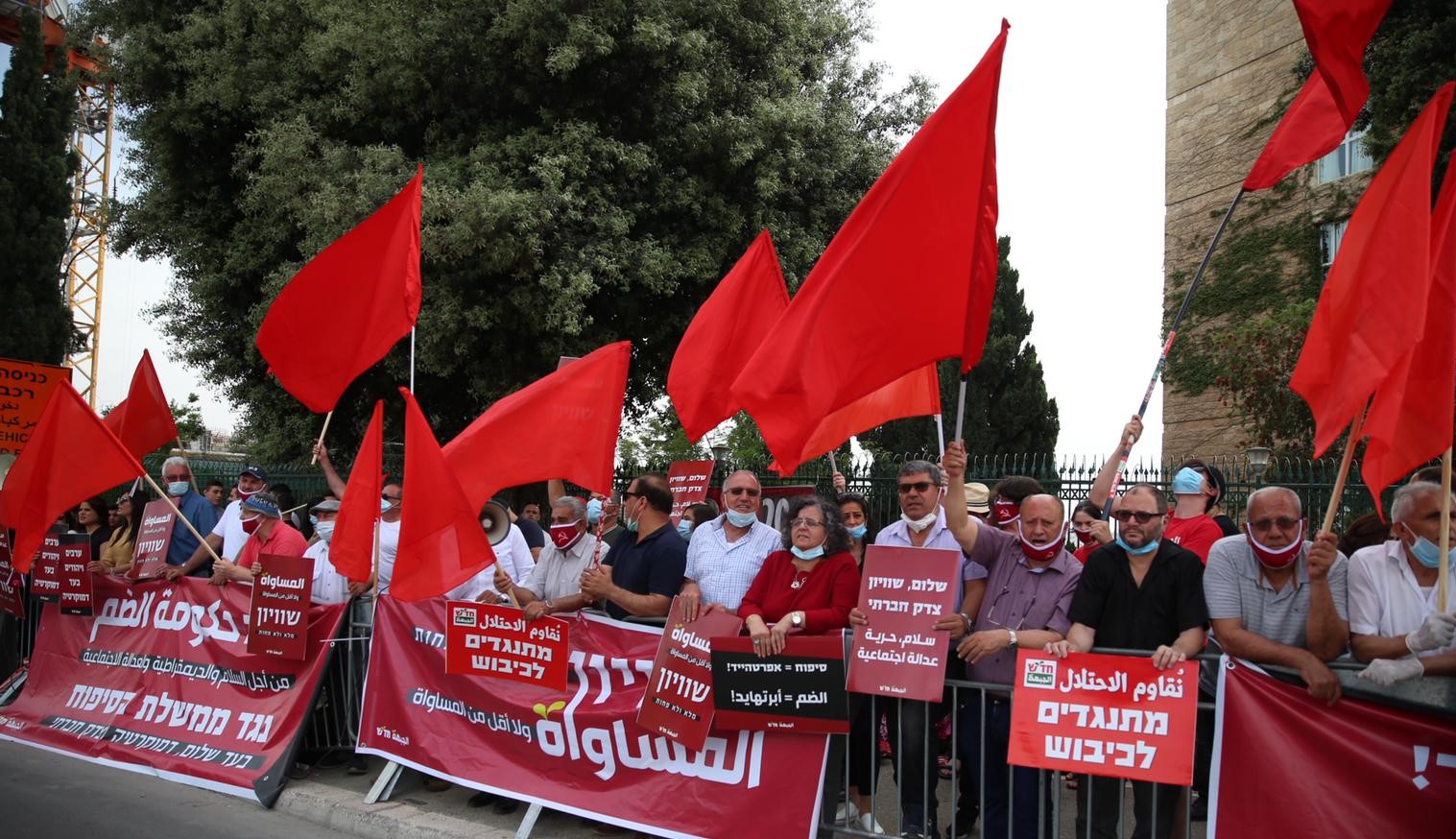Approximately a thousand citizens of Israel from various movements and groups gathered outside the Knesset in Jerusalem on Thursday evening, May 14, primarily to protest the swearing-in of the new Netanyah-Gantz government, among them scores of members of Hadash and the Communist Party of Israel (CPI). But because of internal squabbles within the Likud, the ceremony was postponed until Sunday, May 17.

Members of Hadash and the Communist Party of Israel protest near the Knesset, on Thursday evening, May 14. (Photo: Zu Haderech)
Hours before Israel’s new far-right “unity government” was finally set to be sworn-in, Blue & White chairman Benny Gantz accepted a request by Prime Minister Benjamin Netanyahu to postpone the ceremony until Sunday, as the Likud leader struggled to divide the remaining available ministerial posts in his incoming coalition to lawmakers from his own Likud party. Numerous Likud MKs, some of them ministers and veteran lawmakers, were privately and, in some cases, publicly rebelling against Netanyahu, furious that they had been offered minor government positions or no post at all. At least two, former ministers Avi Dichter and Tzachi Hanegbi, both of whom were passed over for ministerial positions, vowed they would boycott the swearing-in ceremony.
Protests outside the Knesset and the nearby Ministry of the Treasury were held by a number of social, peace and rights organizations alongside Hadash and CPI members, including General Secretary of the CPI, Adel Amer, and Joint List MKs Ayman Odeh, Ofer Cassif, Aida Touma-Sliman and Jaber Asakla. The leader of Yesh Atid, MK Yair Lapid (a former ally of Gantz within the original Blue & White movement that was shattered with Gantz’s decision to join Netanyahu in an “emergency unity government), and who is expected to head the parliamentary opposition, at one point approached the protesters for a few minutes to express his support.
Hadash and communists protests against the annexation of the Palestinian occupied territories and the neo-liberal economic and social policy of Netanyahu, accuse the government of being out of touch with the dire situation prevailing in the country, as manifested in the decision to create 36 cabinet posts, the largest cabinet ever (in fact, 30% of the 120 elected MKs), at a time when unemployment has soared to 25% as a result of the coronavirus pandemic.
Joint List party chairman Odeh told journalists that “US President Donald Trump’s ‘Deal of the Century’ apartheid plan will fail. The only painful question is how many orphans and bereaved parents will it produce on both sides?” Odeh added, “It is imperative for anyone who believes in democracy to fight this dangerous plan within Israel and in coordination with partners from all over the world.”
Members of the “Black Flag” movement were also outside the Knesset demonstrating against the “new mafia-like and anti-democratic government,” and verbalized their opposition to the newly created position of “alternate prime minister,” a post that could allow Netanyahu to remain in office even after the swap of premiership with Gantz and throughout his corruption trial and potential appeal process.
The “100% Coalition,” a social front demanding full compensation for lost wages and income due to the coronavirus crisis was also there, as were organizations like the Movement for the Quality of Government in Israel and Peace Now, along with hundreds of tour guides, travel agents, trip planners and hotel and transportation workers demanding immediate government support for small businesses in the struggling tourism sector. This last protest, organized by 14 different professional associations and unions from across the tourist industry and tourism-dependent sectors, called on the government to look beyond the airlines, hotel chains and large travel agencies, and to also provide them with suitable financial assistance.
At the same time, a separate protest by 250 people from the Arab-Druze and Circassian communities took place. The demonstrators arrived in a convoy of vehicles that set out from the Latrun Junction and demanded that the government abrogate the “Nation-State” law, fulfill its pledges to distribute funds to regional councils, and manage the construction crisis impacting their communities.
Related: Towards Swearing-In of New Gov’t, Street Protests Spread Nationwide


